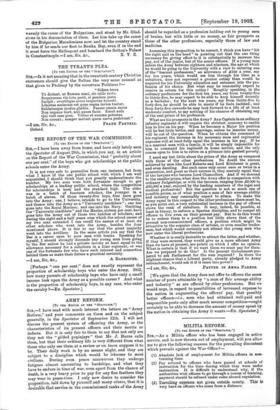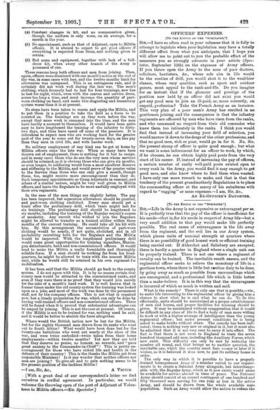MILITIA REFORM.
[TO THE EDITOR OP THE "SPECTATOR.")
SIR,—As a Militia officer who has been engaged in active service, and is now thrown out of employment, will you allow me to give the following reasons for the prevailing discontent which prevails against the War Office F-
(1) Absolute lack of employment for Militia officers in non- training time.
(2) Pay refused to officers who have passed at schools of instruction for the time during which they were under instruction. It is difficult to understand why, if the authorities wish officers to go through a course of training, payment should be refused under some absurd regulation.
(8) Travelling expenses not given. outside county. This is very hard on officers who come from a distance. (4) Constant - changes. in kit, and no compensation given, -though the uniform is only worn, on an average, for a month the year.
, th (6) No appointment, such as that of Adjutant, open to Militia officers. It is absurd to expect to get good officers if everything is expected from them, and nothing given in return.
(6) Bad arms and equipment, together with lack of a full- dress kit, when every other branch of the Army is possessed of one.
These reasons keep both officers and men from joining. Then, again, officers were dismissed with one month's notice at the end of the war, in some cases with less, and the twelve months limit for allowances was reimposed. This is an outrageous rule, and it certainly did not work well during the late war. The men's clothing, which formerly had to last for four trainings, now has to last for eight, which, even with the canvas and service dress, seems too long a time,.and must increase the quantity of part- worn clothing on hand, and make this disgusting and unsanitary system worse than it is at present.
No steps have been taken to rearm and equip the Militia, and to put them in a position to take the field as a force to be counted on. The trainings are -as they were before the war, except that more work is crammed into the time, and the men have hardly a moment to themselves. It would have been quite easy to have lengthened the training of the infantry to forty- two days, and thus have eased off some of the pressure. It is ridiculous to expect men who are working hard for the greater part of the year to come out for twenty-seven days, on less pay than they earn in civil life, and with harder work.
No military employment - of any kind can be got at home by Militia officers since the late war. When so many have been thrown out of employment, there is nothing for it but to resign, and in many cases those who do are the very men whose services should be retained, as it is obvious those who can give six months, or even longer, to soldiering would form a most excellent Reserve and stiffening to the Militia, and would prove of far greater value to the Service than those who can only give a month, though these, too, might receive more encouragement than they do. Such temporary appointments as Camp Adjutants in summer, and others of a similar nature, might be very well given to Militia officers, and leave the Regulare to be more usefully employed with their own regiments.
In the case of the men things are slightly better. The pay has been improved, but separation allowances should be granted, and part-worn clothing abolished. Every man should get a tunic after the preliminary drill, which tunic might last for six trainings. The preliminary drill should be lengthened to six months, including the training of the Regular recruit's course of musketry. Any recruit who wished to join the Regulars might be allowed to transfer as a trained soldier within three months of the current training. He could take all his kit with him. By this arrangement the accumulation of part-worn clothing would be nearly, if not quite, abolished, and in all probability recruiting both for the Regulars and the Militia would be improved. With the lengthened preliminary drill would come great opportunities for training signallers, Maxim- gun detachments, band and non-commissioned officers. It would tend to make the Militia a really formidable and thoroughly reliable force. If a man should be working far from his head. quarters, he might be allowed to train with the nearest Militia unit, while he would still be retained' in his own regiment for mobilisation.
It has been said that the Militia should go back to the county system. I do not agree with this. It is by no means certain that county men would be attracted to the commissioned-ranks, and even if they were there is no proof that they would join merely for the sake of a month's hard work. It is well known that in former times under the old county system the training was looked upon as a joke, and most of the work was done by the permanent staff, not by the company officers. This is not what is required now, but a steady preparation for war, which can only be done by having well-trained officers and non-commissioned officers. These will be found when it is proved that substantial advantages can be reaped by joining. This is not the case at present. Of course, if the Militia is not to be trained for war, nothing need be said, and it would be better to abolish the force altogether.
Where would the British nation now be but for the Militia but for the eighty thousand men drawn from its ranks who went out to South Africa? What would have been done but for the twenty-one battalions who went out nearly at the close of the war, and were twice embodied—twice taken from their home amployments—within twelve months? Yet now they are told that they deserve no praise, no honour, no rewards, and "gave great anxiety to the Commander-in-Chief " ! This is pretty en- couragement for those who have risked life and health in the defence of their country! This is the thanks the Militia get from responsible Ministers ! Is it any wonder that neither officers nor men are joininF ? To give all and to gain nothing seems to be the present position of the luckless Militia!
—I am, Sir, &c., A VICTIM.
- [With a great deal of our correspondent's letter . we find ourselves in cordial agreement. In particular, we would welcome the throwing open of the post of Adjutant of Volun- teers to Militia officers.—En. Spectator.]







































 Previous page
Previous page